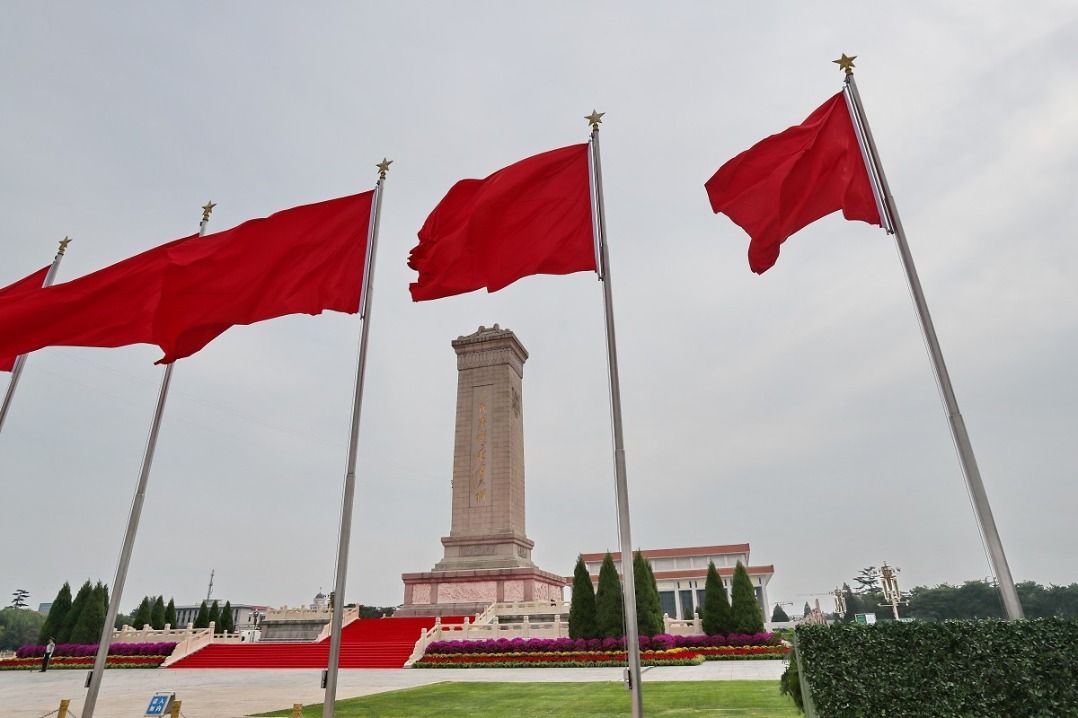Perception dilemma
In the closed-loop interaction among the US and its allies, negative perceptions of China are continuously strengthened and escalated


The summit between the heads of state of China and the United States in November sent positive signals for the stabilizing of relations between Beijing and Washington. However, the relationship is still confronted with various structural issues, and the deterioration in their perceptions of each other continues.
At the beginning of this year, US National Security Adviser Jake Sullivan delivered a speech with a stark negative tone toward China at the Council on Foreign Relations, despite having long talks with Chinese Foreign Minister Wang Yi, on multiple occasions, including in Vienna and Bangkok.
The key is to improve relations and enhance the quality of communications to reduce negative perceptions. For China-US relations to stabilize and take a turn for the better, emphasis should be given to avoid the two sides' perceptions of each other, especially the US' perception of China, sliding into a dilemma of "internal circulation", mainly manifested in the following three aspects.
First, the dilemma in US' perception of China being reflected in the increasingly domestic nature of its construction of perceptions about China, which has become more of a domestic conversation. In recent years, due to the continuous deterioration of China-US relations, compounded by the COVID-19 pandemic and other factors, direct communication channels between China and the US have been significantly impacted. The China-US relationship used to rely on a rich network of dialogue mechanisms across various levels and fields. These channels not only implied and fostered interdependent interests and friendly exchanges but more importantly constituted an important platform for constructing accurate perceptions of each other.
A dense and direct communication dialogue network offered the possibility for the both sides to construct accurate, rational and pragmatic perceptions of the other, as well as opportunities for correcting negative perceptions. In international relations, the perception of other countries should be a dynamic process constructed through a myriad of interactions. Unfortunately, due to a severe lack of direct, high-quality communication dialogues and the internal pressure formed by the mainstream negative perception of China, the US' perception of China has increasingly evolved into a "domestically circular" mode of self-affirmation of its negative perception of China. In this mode of perception construction, correcting negative perceptions becomes increasingly difficult, and the drawbacks of perception solidification not only make it difficult for the innovation of internal dialogues but also stimulate the escalation of China's negative perception of the US.
Second, the dilemma of the US' perception of China is manifested in the emphasis on synchronized perceptions of China among "like-minded countries". In recent years, "like-minded countries" has become an increasingly frequently used phrase in US and Western diplomacy. After the outbreak of the Russia-Ukraine conflict, the theory of expanding and deepening cooperation among "like-minded countries", as a lesson from the Ukraine crisis, has become increasingly popular in the West. This logic has also extended to perceptions of China.
Following this logic, the military deterrence corresponding to China's "aggressiveness" and the "partial decoupling" in economic security have emerged. Once such narratives become mainstream among "like-minded countries", they are continuously repeated and reinforced through summits, joint statements and news conferences. With the negative tone already set, these meetings easily become platforms for competing to identify problems with China, and negative perceptions of China are continuously strengthened and escalated in this closed-loop interaction among allies. This is observable in the interactions within the US' bilateral alliances, the G7, or the AUKUS framework, which, in turn, stimulates the escalation of China's negative perception of the US. However, the international community is a large family composed of nearly 200 countries, and international relations are in a historic period of major changes. It is normal for countries to have diverse and fluid perceptions of international relations. This means that the stability of international relations requires communication and dialogue among countries with different views, seeking common ground while reserving differences, and achieving consensus for cooperation.
Third, the dilemma of the US' perception of China is also reflected in the discourse system built on a basis of unilateral superiority, which is conveyed through the media to society, leading to a negative perception of China in US society. In recent years, the discourse systems of the US and the West have frequently stressed that the liberal international order is facing unprecedented shocks. Whether it's the National Security Strategy published by Washington, the G7 declarations, or the "Indo-Pacific" strategy, "the liberal international order" is a key term. Within this discourse system, China is directly or indirectly identified as a major challenger to the so-called liberal order, and this perception is continuously replicated through the Western media network, deepening the stereotyped view of the US and Western public.
For China-US relations to achieve sustainable improvement, it is necessary to promptly restore various channels of communication to avoid falling into the dilemma of "domestic circulation "in perception, where negative perceptions of each other are continuously escalated in a closed environment, creating an "echo chamber effect". Otherwise, dialogues will become an endless "spinning of wheels", consuming patience between each other and exacerbating mutual accusations, which in turn causes a negative escalation of perceptions. Pragmatic, rational, friendly, and peaceful mutual perceptions require genuine dialogue, with mutual respect the essential foundation.

The author is an associate professor of international relations at Niigata University in Japan and a non-resident senior fellow at the Center on Contemporary China and the World at the University of Hong Kong. The author contributed this article to China Watch, a think tank powered by China Daily.
Contact the editor at [email protected].
































